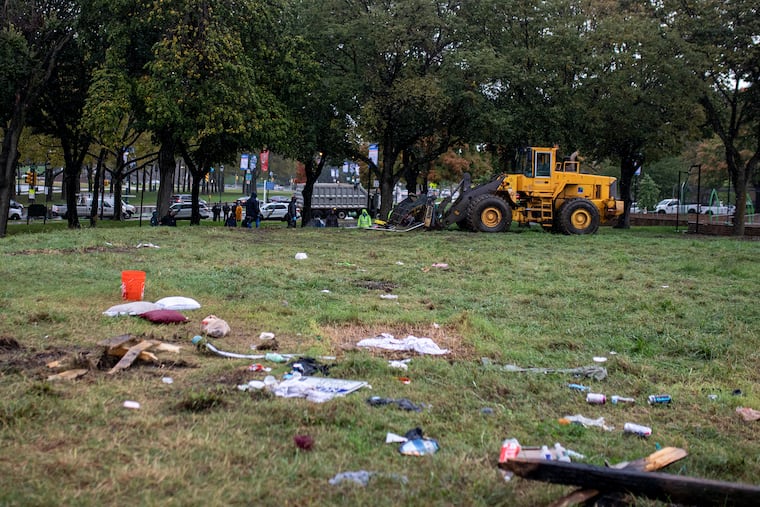Seeing police and machinery, inhabitants of Parkway homeless encampment thought they were being invaded
On Friday, it was impossible to tell with any accuracy how many of the dozens of tents still standing contained people.

A front-end loader tore through the mud at the homeless encampment on the Benjamin Franklin Parkway on Friday morning, with a handful of police officers standing by.
That scene kicked off panic among inhabitants still living at the site, which is being vacated in exchange for the city’s promise to provide 50 houses within six months, and two tiny-house villages by June 30, for residents of the tent community on a ball field at North 22nd St.
As the ground shook, they believed they were witnessing an assault that city officials had promised would not come.
When it turned out the machinery was there to collect the wooden pallets that had been used for months as fortifications to block a potential police incursion, the remaining occupants were only slightly mollified.
“I don’t understand what makes the city think it’s a smart thing to bring in a machine like that in the middle of a contentious situation,” said Jennifer Bennetch, an encampment organizer. “I’m out here trying to hold all this together.”
Bennetch thought the city was sending a trash truck to pick up loose pallets and garbage at the site. She said she hadn’t expected the dismantling of the defensive perimeter.
“People in a homeless encampment see police and [what looked like] a bulldozer, and they think it’s what they were dreading all summer,” Bennetch said. “There was a lack of communication here.”
In response, a city spokesperson said, “We understand that there was confusion about the type of equipment that would be on site today. We have been in touch with the organizers today and will continue to work to tighten communications.”
While Bennetch said she saw “five or six cops,” the spokesperson said there were three officers.
The morning’s events may have a lasting effect, Bennetch worried. “Everybody is mad now and talking about not leaving.” But several encampment residents said later that they still plan to depart.
City officials had said encampment occupants would be asked to quit the site by the end of the week, though Bennetch said, “The city told us as long as they see an honest effort to leave, we can take a few more days.”
» READ MORE: Benjamin Franklin Parkway homeless encampment to be closed ‘amicably’ by the end of the week
The city spokesperson did not comment.
On a cool and dreary Friday best spent out of the rain, it was impossible to tell with any accuracy how many of the dozens of tents standing on the grounds of the Rodin Museum and in Von Colln Memorial Field contained people. Many of the tents were zipped up.
Awaiting the chance to live in houses, encampment occupants will be placed in temporary housing, city officials said.
Nine individuals from the encampment were assigned to various locations on Friday, officials said. In all, 186 residents from the site, as well as from an additional encampment that until about two weeks ago had stood outside the headquarters of the Philadelphia Housing Authority in North Philadelphia, have been afforded some form of housing, city officials said Friday.
As of Thursday, there had been 48 to 72 people living at the Parkway encampment, officials said.
The agreement between the city and the organizers of the encampment was hailed by national experts on homelessness as unprecedented.
No homeless encampment that started out as a protest — this one for housing, as well as for Black Lives Matter — has ever resulted in a deal in which encampment occupants and organizers establish a nonprofit organization and a community land trust in their name to oversee housing for impoverished people, national advocates said.
On Friday, tucked in a tent away from the unrelenting rain, James, 24, who’s lived in the encampment since it began on June 10, said he planned to move away by the weekend to live with an aunt until the 50 houses are ready.
“It’s a good deal,” James said. “I hope the city holds up their end of the bargain.”
» READ MORE: Philly’s housing deal with occupants of Parkway homeless encampment seen as ‘unprecedented’ nationwide
Ty-San Bostick, 39, who’s lived at the encampment only a month but is already an unofficial spokesperson, said numerous occupants have left, having packed their belongings in black rolling bins provided by the city.
He said that “some people aren’t sure they want to leave because they think they’re being sent to live with asbestos in abandoned buildings.” Bostick added that he realizes the houses are scheduled to be refurbished first.
“I think it’ll be fine, and I believe things will be positive around here in the next few days,” he said.
Tony Smith, 35, who was planning to leave for temporary housing on Saturday, said he hopes to fix up one of the 50 houses himself.
Having lived at the encampment during its entire four months, he said “it’s been cool” to be part of a community.
“The best part is the protesting we did for housing,” he said. "We got our point across.
“But I won’t miss this place. I’ll have a house.”